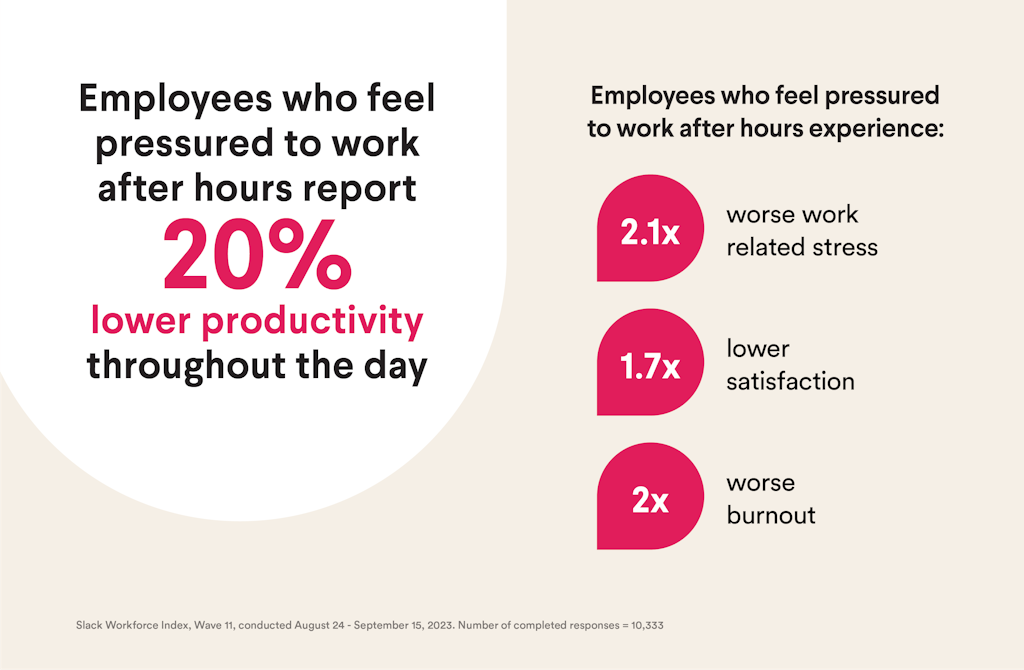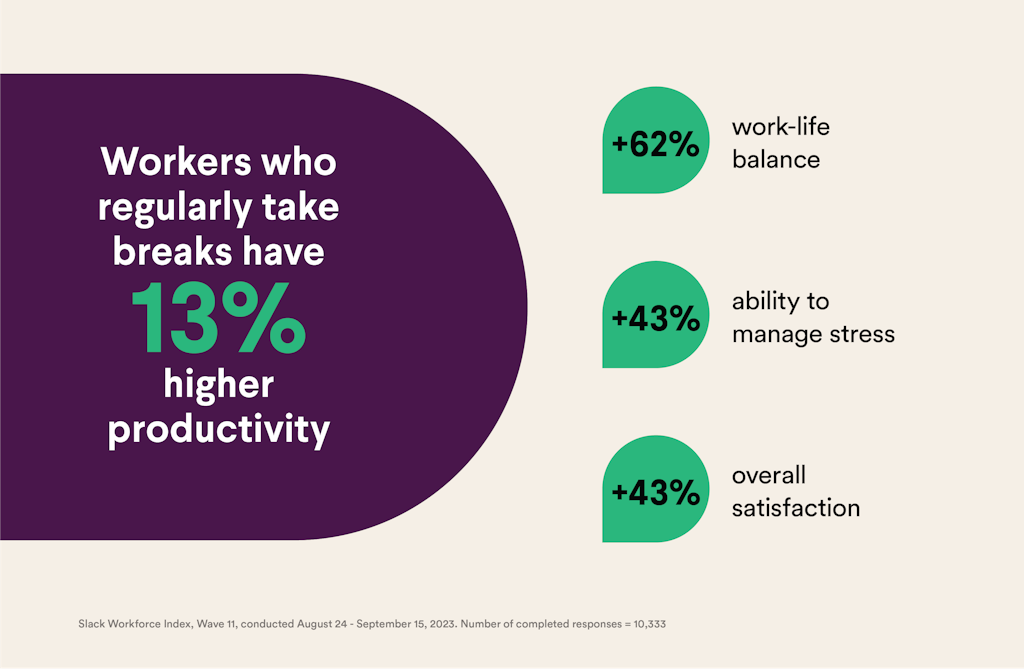Working late or hardly working? Slack says to stop logging on after hours
Last updated on 14 December 2023

There’s a surprising connection between after-hours work and decreased productivity for desk-based employees, prompting a warning for those of us who often linger on the computer well after the day should have ended.
Key points
- Slack, a workplace messaging platform, surveyed over 10,000 desk-based workers for their 2023 Workforce Index
- They found that employees who log off at the end of their workday register 20% higher productivity than their colleagues who feel they need to work after hours
- The average desk worker said the ideal amount of focus time is approximately four hours a day with any more than two hours of meetings in one day too much
- Meanwhile, the majority of employees feel 3pm-6pm is the least productive time in the day
Sometimes, everyone has to work late. Whether it’s due to an impending report deadline, an unexpected work emergency or because the department is short-staffed, it’s not always possible to clock off on time every day.
But Slack’s data revealed that roughly two out of five employees are working late or logging onto their devices after hours. Those same workers are also two times more stressed than their colleagues, twice as likely to be experiencing burnout and are less satisfied with their jobs.
Those figures are concerning as there’s no personal desire to continue working, rather, they feel pressured to work late to not fall behind. Christina Janzer, Senior Vice President of Research and Analytics at Slack, said it’s important for employees to remember that working more hours does not mean they will be more productive.

“We’ve long seen a focus on quantity over quality across many aspects of work, from how we spend our time to how we define productivity. Constantly feeling like you need to catch up is hurting employees and businesses,” she said.
“This underscores the importance of building a culture of trust where employees feel safe enough to speak up when they need help prioritising and have the right balance of time in the work day to get work done.”
Quality over quality
Interestingly, both groups of employees (those who work late and those who do not) self-reported that they feel productive for about 70% of the day. That means both cohorts are putting in the same effort, it’s just some are working more. Often that extra time is not quality work time, either, as competing priorities such as family, personal errands, etc, dilute the efficiency of after-hours work.
This is why quality over quantity has never been truer. Slack’s data shows that timing is everything, including opportunities for workplace connections, collaboration and breaks.
- One in five employees do not have enough time to connect with their coworkers, with junior employees feeling the most pressure to work and not socialise
- Half of the workforce also avoids taking breaks with 50% rarely or never having time away from their desk. Those workers are almost twice as likely to experience burnout
- Employees who embrace breaks recorded higher scores for positive work-life balance, a greater ability to manage stress and productivity
With many employees reluctant to take time off for themselves, even a few minutes in the day, Ms Janzer said managers and employers must foster an environment where breaks are encouraged.
“There’s a really big opportunity for managers to play a bigger role in helping people prioritise and take the time that they spend at work and make it time well spent,” Ms Janzer told Forbes.

Therefore, quality work time is essential. There’s no reason to work longer while feeling burnt out when there is the “Goldilocks Zone”. On average, surveyed desk workers said they have a four-hour period where productivity is at its highest. With 3pm generally the drop-off point, most employees are at their best between 8am and 3pm, according to Slack.
Balance is important as filling this quality work time with hours of meetings will only erode any gains made. David Ard, Senior Vice President of Employee Success at Slack and Salesforce, said workdays should be designed to nurture collaboration when productivity starts to dip.
“Focus time, collaboration time, connection, and rest are like the macronutrients of a workday. The right balance gives you the energy you need to work your best. We cannot consider these critical components of our work in silos. To be our most effective, we must create the space for collaborative work and for focused work,” he said.
Slack’s complete results and further analysis are available on their website.